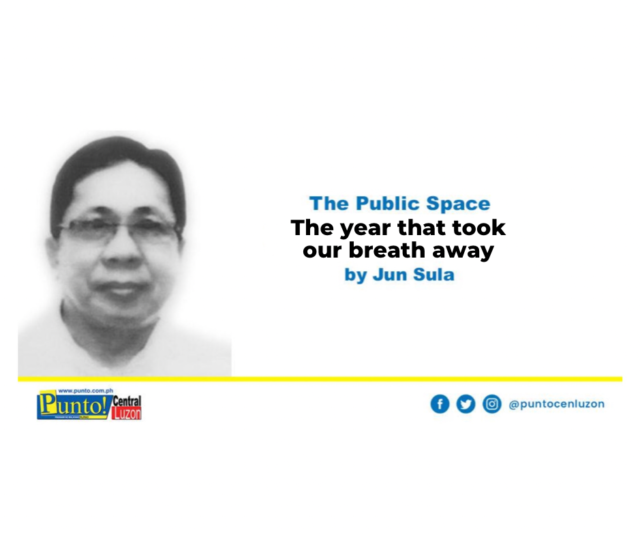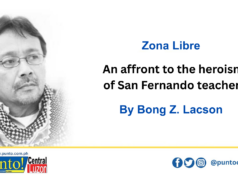CHRISTMAS, deeply understood, convinces us that the past will not pursue, much less haunt, us anymore. Rather, it will usher us into a new time and space — the continuum of history—into a future with our own version or vision of what it should be like. A vast improvement, in all its possible implications , in terms of existential relevance. A sort of a promised land.
In other words, the Season, whether concocted or designed, prepares us to be better persons to face what’s ahead with its new challenges, opportunities and, with a big unclenched fist , whatever adversities may lurk around the bend to ambush or blindside us. We are not enemies, never were. Therefore, ‘let’s notquarrel, Lucrezia”. Or Leni.
In this age of acceleration, the virus was like afierce headwind that nearly put much of the world on freeze, making many people gasped for breath, literally and figuratively, and the states or governmentsstanding by like George Orwell’s big brother. They were not only watchful but nervous, willing and able to impose their brute will. It was Nature’s version of nihilism at work mindlessly abetted by those whose ideas or experience in impacting society run alongunbenign, even cruel, parallel lines.
This doesn’t mean the past is not relevant as we move forward into what is still unknown. It is in remembering that we wisely leave it, pain and all, behind. In looking at our scars, we remember the pain. In recalling the sad narrative, we can’t but occasionally gaze at the stars for answer or assurance, notwithstanding Mark Antony’s rebuke of Brutus.
“All evils in the world as well as the plague,” wrote French Albert Camus in his novel La Peste,” help men to rise above themselves.” Goethe was as encouraging: that which does not kill us will only make us strong. Our reach must exceed our grasp, wrote Robert Browning, or what’s Heaven for.
On Facebook, some of my former high school classmates tried to outdo each other to describe the pandemic in one word: Covid, bad, mask, and so onand so forth. In the end, it’s all of the above. Both experience and insight attempted to label the calamity ,seal it in a box and bury it deeper like an evil curse where it cannot harm and hurt people anymore. To describe something is to control it, somehow.
There is one statement, however, that honestlybut awfully characterized it better , both in the literal and figurative sense, in the real and in the gut feel. That’s how it became a universal statement and immortalized. The string of pained words came out agonizingly out of American George Floyd’s lips as he lay on the street pavement with a police knee planted on his neck: I can’t breathe.
We had breathing problems in 2020.
People who caught the debilitating virus had difficulty breathing, some because of the virus itself , others because of abject institutional failure or individual incompetence. Under a different spell, small voices were not given a chance to speak their rights even under their breath by those who believed human rights were not divine birthrights. The Numinous obscured arrogantly by nondescripts. There were countless more who could hardly breathe because of the loss of loved ones, jobs, savings and hopes that things would get better before they got worse.
The original Christmas was not without its own austerity and adversity. The One born in a manger onthat day could have been inevitably greeted with the smell of animal feces as He was welcomed by thelowly shepherds, according to Julian Baggini, author of The Godless Gospel. Severity as well as serenitypreceded salvation. Even this pandemic Christmas, with less footfalls and profits for the ubiquitous merchants of the Season, looked more festive and auspicious by human standard. Yet the first was breathtaking, not breath-stifling. We try to overdo it and still come short every time because we miss the point by a mile.
Weeks before last Christmas, a survey showed that majority of Filipinos feared a future still blighted by the virus plague. But after Christmas, the last polls indicated a change of heart or inoculated with a boosterof faith. More than 90 percent was hopeful this time around that 2021 would be a much better a year.
What a huge difference the longest Yuletide season in the world can make! It is meant to be, not as lamppost but as an illumination.
So, here we are, resonating St. Paul, who hadsaid he was leaving the past behind and pressing for the high calling, which is no less than a national healing and recovery for us , the putative theme of President Duterte’s New Year’s message to the people.
As always, we live up to our well–known if unenvied reputation as a people who easily forget and forgive, hoping our leaders, for all their foibles, failures and constant lies, would finally show the better angels of their Nature. Perhaps, they would emerge with men of stronger character which, for Portuguese philosopher Baruch Spinoza, meant hating no one, is angry at no one, envies no one, and despises no one. Health Secretary Francisco Duque has started the ball rolling by admitting that he had blown it many times last year and promised, like a votive offering, to do better this time. Next, please.
We all deserve to breathe freer, better, kinder to take on what’s in front of us.





